Here comes Dad – and he’s muttering a mantra: “My name is Winston Smith and only good things happen to me.” With a name shared with the everyman protagonist of George Orwell’s Nineteen Eighty-Four, and a compulsive intoning of this self-affirmation, the start of Nancy Farino’s Fatherland signals the fact that daddy issues will dominate its emotional landscape. As a graduate of Hampstead Theatre’s Inspire Writers Programme, the actor-playwright enjoys not only an entertaining production of her 100-minute debut play in this venue’s studio space, but also plays one of the two lead roles in this father-daughter drama.
The plot begins when Winston arrives without warning at the flat of his daughter Joy (Farino), and manages to persuade her to join him on a spontaneous road trip from London to County Mayo in Ireland. The vehicle is “Buster”, a camper van which was once a school bus, and the mission is to discover the roots of Winston’s side of the family.
But while he is a life coach, and full of manic energy, the 26-year-old Joy, who works as a teacher with infants, suffers from depression and is not very keen on bonding with her erratic parent. Soon it emerges that Winston has his own big problems: he is being sued for negligence by the wealthy family of one of his clients.
Like other road trip stories, Fatherland is about an odd couple who, at first hilariously, really shouldn’t be spending time together in the enclosed space of a bus. Our suspicion that Winston is a really difficult, often unbearable, character is confirmed as Farino splices in flashbacks to his evasive conversations with Claire, a young lawyer who, against her better judgement, agrees to help with his legal liability case. So the play is structured not only as a journey of discovery, but also as a discussion about Winston’s practice of therapy, as well an look inside the mind of a depressive as Joy privately monologues about her feelings.
These three fragmented aspects of the play are beautifully written: the interactions between Winston and Joy are realistically awkward, but also very funny, full of jokes and pop music from an old CD player; with Claire, however, Winston is at first in denial about his responsibility for negligence and his extravagant logorrhoea tests the patience of both Claire and the audience — can we sympathise with such an unlikable character? The third strand, in which the ironically named Joy, an insomniac, shares dreams and feelings of being harassed by extreme cold, offers a poetic and subjective sense of the inner world of the depressed. It’s very individual, personal and moving.
But it’s Winston who dominates the play, his naming of his daughter suggesting a hippy-style optimism that also animates his work as a life coach, for which he has failed to take out any insurance. Typically, his self-affirming mantra is delusionary and his experience of fatherhood is shown to be irresponsible. He left Joy’s mother, who has been diagnosed with breast cancer, for a series of other women and is now settled with Nicole, who he disparages as “so Ovaltine”. His conclusion that “life goes on” is bland and evasive, and contrasts with his daughter’s struggle to cast off the cold darkness and move into the sunlight. As she says, “I want to shut my eyes and call in Spring.”
Fatherland stages the anxiety felt by children that their life choices have been adversely affected by irresponsible parenting. Joy realizes that her inability to have fulfilling relationships with “shit men” is connected to her father’s erratic presence, often absence, in her childhood, while at the same time realizing her own inability to say no to him. She really could have refused to go on this road trip. But when she complains about his lack of responsibility, which is also evidenced in his legal troubles, he responds that she should take more responsibility for her own life – and not just put the blame on her parents.
By contrasting the verbally incontinent and aggressively cheery Winston with the quieter and more self-reflective Joy, Farino sets up a psychological situation that is both singular and archetypal. She shows how unsaid needs and unexpressed feelings can accumulate and create a profound sense of loss. At the same time, the theme of healing and therapeutic intervention is explored through the focus on Winston’s rather freewheeling, under-qualified but goodhearted, practice, and a brief reference to Joy’s own therapy. Even Claire shares a moment of her past family experiences.
Tessa Walker’s production, on designer Debbie Duru’s bare stage, brings out the humour and the moments of tenderness and sadness in this play which, although quite slender, has a kind of perfect meditative integrity. Its soft plotting allows us to concentrate on the well-drawn characters, although at the same time it seems a shame not to have the time and space to find out more about them all. The play lacks fullness. In particular, I long to find out more about Joy. But although it’s low on drama, apart from a catastrophic climactic episode, there is a lot to enjoy, from the Weather Girls singalong and references to Bono to Christopher Nairne’s lighting and Rebecca Wield’s movement direction. And the acting is really excellent.
Jason Thorpe is completely convincing as the free-thinking Winston, whose compulsive positive thinking is clearly a cover for deep feelings of guilt as he realizes the consequences of his irresponsible behaviour. By contrast, Farino mixes a barely repressed anger at the psychological inheritance she has inherited with an open exasperation with the parent that complains about her vaping and whose music and life choices she questions. Her embrace of mythical ideas of freezing is a powerful metaphor for her state of mind. Finally, Shona Babayemi’s Claire is an attractive performance of a professional who fears she’s not up to the job. Farino’s writing, both delicately allusive and robustly real, shows great promise.
Fatherland at the Hampstead Theatre until 29 November



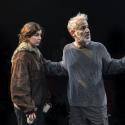
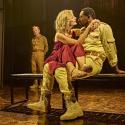
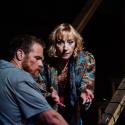
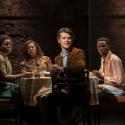
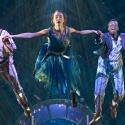


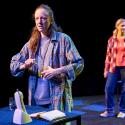
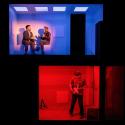



Add comment